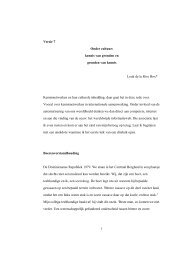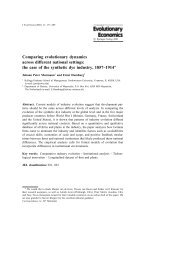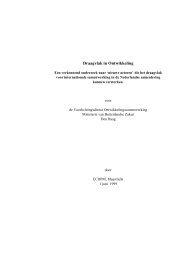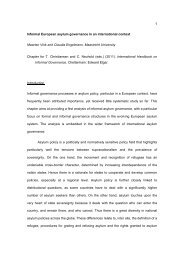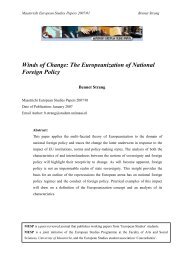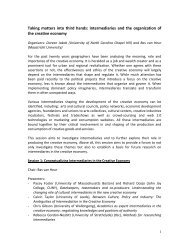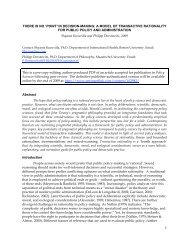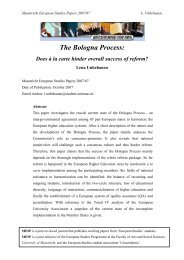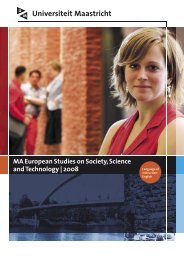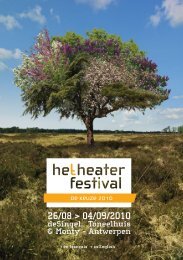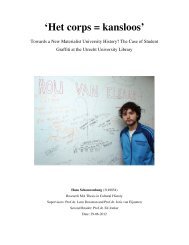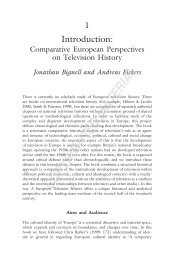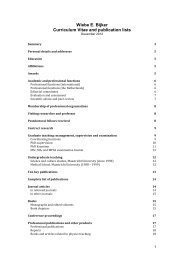Crossing the divide: - Maastricht University
Crossing the divide: - Maastricht University
Crossing the divide: - Maastricht University
Create successful ePaper yourself
Turn your PDF publications into a flip-book with our unique Google optimized e-Paper software.
done abroad, which was <strong>the</strong>n passed top-down to <strong>the</strong> contract growers. Disciplinary<br />
approaches could be quite productive in <strong>the</strong> cacao case, provided <strong>the</strong> growers were<br />
linked in <strong>the</strong> knowledge network.<br />
The notion of a knowledge network is <strong>the</strong> key to <strong>the</strong>se modes. I see a network as a<br />
relatively loosely structured form of cooperation, in which coordination is done<br />
through a horizontal exchange of information, lacking a clear hierarchy (see also<br />
Chataway 1999?: 9). It is composed of communication links between individuals or<br />
groups. The network notion stresses <strong>the</strong>se linkages and allows participants to<br />
exchange information and attach meaning to it, thus transforming information into<br />
knowledge. In contrast with <strong>the</strong> dominant Mode 1 type of knowledge production, it<br />
stresses horizontal exchanges of information. In contrast with Mode 2 type of<br />
knowledge production it allows for disciplinary (Mode 1) knowledge generation and<br />
exchanges, as well as trans-disciplinary (problem-oriented) knowledge generation.<br />
I argue <strong>the</strong>refore that <strong>the</strong> current trend appears to be a syn<strong>the</strong>sis of <strong>the</strong> two modes.<br />
Knowledge is not just verified within <strong>the</strong> scientific profession (peer review), or just<br />
falsified on <strong>the</strong> basis of review in <strong>the</strong> context of application or use (user review).<br />
Both systems of quality maintenance are operative. Paul Richards (1994: 166) calls<br />
this type: “knowledge that is in conformity with general scientific principles, but<br />
which, because it embodies place-specific experience, allows better assessments of<br />
[local] risk factors”. For example, cacao breeders in <strong>the</strong> Costa Rican agricultural<br />
research station had to make <strong>the</strong>ir scientific case within <strong>the</strong> community of<br />
professional plant breeders; in <strong>the</strong> knowledge network, users also provided <strong>the</strong>m<br />
with <strong>the</strong> practical validation. It was <strong>the</strong> combination of <strong>the</strong>se two that made for<br />
dynamic innovation.<br />
... knowledge for development goes beyond <strong>the</strong> collection of best<br />
practices and <strong>the</strong> accumulation of successful anecdotes …<br />
why do certain policies and practices work in some circumstances<br />
and not o<strong>the</strong>rs? Thus research is a central element<br />
of knowledge for development.<br />
Stiglitz (1999: 319)<br />
An empirical basis for development policy?<br />
.After a half-century of technical assistance and development cooperation, <strong>the</strong>re<br />
have been precious few empirical studies analysing development-oriented research<br />
cooperation. A recent literature review notes that “... little of <strong>the</strong> material is <strong>the</strong> result<br />
of systematic studies of North–South research partnerships” (Spaapen 1999: 3; 16).<br />
Interviews and searches, which I have recently done in <strong>the</strong> United States, France,<br />
Sweden and <strong>the</strong> Ne<strong>the</strong>rlands, indicate that such a literature is absent; and that<br />
those studies that have been done are generally descriptive, evaluative or<br />
prescriptive. Jacques Gaillard (1999:13; 263), one of <strong>the</strong> best-informed authors on<br />
this subject, writes: “Information in this field is often difficult to obtain [is often partial]<br />
and incomplete”. Wesley Shrum, recently told me (personal communication 2001)<br />
that he has been pleading for such research but could not get it funded.



